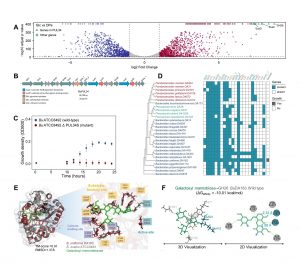A research team jointly led by Elaine Leung Lai Han, professor in the Faculty of Health Sciences at the University of Macau (UM), Dai Lei, principal investigator at the Shenzhen Institute of Advanced Technology of the Chinese Academy of Sciences, and Zhou Hua, professor at the State Key Laboratory of Traditional Chinese Medicine Syndrome and Guangdong Provincial Hospital of Chinese Medicine, has made significant progress in understanding the molecular mechanism by which human gut Bacteroides and Parabacteroides selectively utilise medicinal polysaccharides. The study has important implications for several research areas, including the human gut microbiome, carbohydrate-active enzymes, and the development and application of dietary and medicinal polysaccharides. The research has been published in the prestigious international journal Nature Communications.
The study is the first to report the selective utilisation of Dendrobium polysaccharides by Bacteroides uniformis, a human gut commensal bacterium. Using an interdisciplinary synthetic biology approach, the researchers discovered a unique polysaccharide utilisation locus in this bacterium. Structural alignment and molecular docking analyses further revealed that the GH26 enzyme, with conserved catalytic sites (E415/E504) and substrate-binding sites, is a key enzyme in Dendrobium polysaccharide metabolism. This research pioneers the discovery of critical factors in the utilisation of medicinal polysaccharides by the human gut microbiota, highlighting the highly specific utilisation of medicinal polysaccharides. It advances our understanding of their potential in vivo applications and mechanisms of action, and underscores the potential for precise targeting of the gut microbiota, opening up new avenues for therapeutic intervention.
Manipulation of the gut microbiome using medicinal polysaccharides has emerged as a promising therapeutic strategy for human disease. Human gut Bacteroides and Parabacteroides are known to be the primary consumers of dietary polysaccharides. Understanding how human gut commensal bacteria utilise medicinal polysaccharides is important for the development of novel polysaccharide-based prebiotics and drugs to improve human health. However, a systematic profiling of gut bacterial utilisation of medicinal polysaccharides and the underlying genetic basis is still lacking.
The research team systematically mapped the utilisation profiles of 20 different medicinal polysaccharides by 28 human gut Bacteroides and Parabacteroides species. They found that different Bacteroides and Parabacteroides species showed distinct utilisation profiles of medicinal polysaccharides. Notably, Dendrobium polysaccharides (DPs, a type of glucomannan) specifically induced the growth of Bacteroides uniformis DA183. Transcriptomics and gene knock-out were performed to reveal the genetic mechanism behind the selective utilisation of DPs. The research team identified the key gene cluster PUL34 and the critical enzyme GH26_BuDA183 involved in DPs utilisation. Sequence alignment revealed that only the genome of B. uniformis DA183 encodes the complete PUL34_BuDA183 gene cluster.
Finally, to characterise the activity and substrate specificity of the GH26 enzyme from B. uniformis, the research team compared the protein structure of B. uniformis GH26 predicted by AlphaFold2 with the crystal structure of B. ovatus GH26. They found that the catalytic sites and substrate-binding sites are conserved between these two GH26 enzymes. This suggests that the GH26 enzyme from B. uniformis has a similar catalytic mechanism to that of B. ovatus. The team then expressed and purified the GH26 enzyme and demonstrated its hydrolytic activity against multiple mannans in vitro. Point mutation experiments showed that mutation of either the glutamate residue E415A or E504A leads to loss of enzyme activity, confirming that both catalytic sites are essential for enzyme function. Molecular docking simulations showed that substrate reactivity depends on the ability of the substrates to interact with the catalytic residues.
In general, the study provides a general framework for profiling the utilisation of plant-derived polysaccharides by human gut bacteria and understanding the underlying molecular mechanisms. These findings have important implications for several research areas, including the human gut microbiome, carbohydrate-active enzymes, and the development and application of dietary and medicinal polysaccharides. In addition, the highly specific utilisation of some medicinal polysaccharides (e.g. Dendrobium polysaccharides) also highlights the potential of glycan-based prebiotics and drugs for targeted modulation of the human gut microbiome.
Prof Leung, Dr Dai, and Prof Zhou are the co-corresponding authors of the study. Qu Zepeng, a PhD student at Macau University of Science and Technology; Liu Hongbin, an assistant researcher at the Shenzhen Institute of Advanced Technology of the Chinese Academy of Sciences; and Yang Ji, a faculty member in the School of Chinese Materia Medica at Guangdong Pharmaceutical University, are the co-first authors. The research was supported by regular grants of the Ministry of Science and Technology of the People’s Republic of China and the Science and Technology Development Fund (FDCT) of Macao (File No: 0063/2022/A2, 0018/2024/RIB1, and 0137/2024/AMJ), the Shenzhen Key Laboratory for the Intelligent Microbial Manufacturing of Medicines (File No: ZDSYS20210623091810032), the National Natural Science Foundation of China (File no. 32201313), the 2020 Young Qihuang Scholar of the National Administration of Traditional Chinese Medicine and the FDCT Funding Scheme for Postdoctoral Researchers of Higher Education Institutions (File No: 0017/2021/APD), UM (File No: SRG2022-00020-FHS), the State Key Laboratory of Quality Research in Chinese Medicine (UM) (File No: SKL-QRCM-IRG2023-001 and 005/2023/SKL), and the Ministry of Education Frontiers Science Center for Precision Oncology, UM. The full text of the study is available at: https://www.nature.com/articles/s41467-025-55845-7.
| Source: Faculty of Health Sciences | |
| Media Contact Information: | |
| Communications Office, University of Macau | |
| Albee Lei | Tel: (853) 8822 8004 |
| Bell Leong | Tel: (853) 8822 8009 |
| Email: | prs.media@um.edu.mo |


